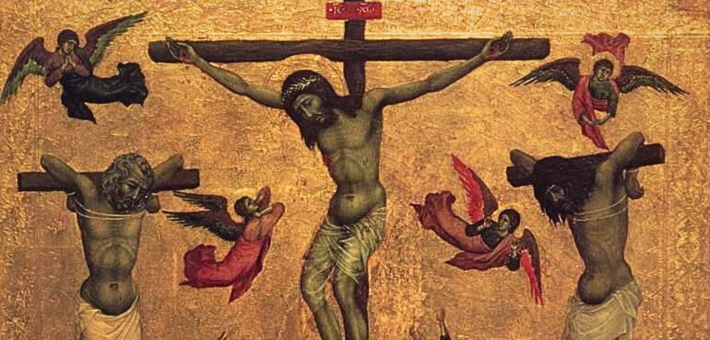Commentary on Matthew 16:21-28
The gospel now recalls some teachings that the disciples will find hard to swallow. Peter’s confession that Jesus is “the Messiah, the Son of the Living God” elicits Jesus’ blessing. Now a stern warning from Jesus echoes in their ears, “don’t tell anyone that I’m the Messiah!” Why? Because Jesus is about to shatter their image of what this Messiah was sent to do. What Jesus “begins” here in verse 21 is a deconstruction of the disciples’ messianic expectations. He tells them that death—not glory—will be shadowing them all the way to Jerusalem where there will be a final confrontation. Lest they forget, he will remind them again (Matthew 17:22-23). What’s ahead is not a throne, but a cross. There won’t be an army of zealots ready to make Jesus their king, there will only be a mocking mob calling for his death.
This is just too much for Peter. His first act as leader-in-waiting for the Jesus movement is to say “no” to Jesus. Saying “no” to the way of Jesus will become a habit for the Church. Too often when Jesus says “Cross!” the church votes “Crown!” In the background of this scene is the time Jesus spent in the wilderness when he said, “No” to the temptation to imperial power. “All the kingdoms of this world and all their splendor” were his for the taking (Matthew 4:8) if Jesus would just bow down, not to God’s way but to Satan’s. Now in this scene with Peter pulling Jesus aside to “counsel” him, Jesus thinks, “I’ve been through this before!” and responds with such force that Peter has to step back. He actually calls Peter “Satan”!
One is reminded of a scene in Fyodor Dostoevsky’s novel The Brothers Karamazov.¹ An important part of that novel is the section “The Grand Inquisitor,” a kind of parable told by Ivan, one of the brothers. It takes place at the height of the Inquisition and Jesus has returned to Earth to the Italian city of Seville. He is arrested by the leaders of the Inquisition as he is performing miracles and is sentenced to be burnt to death the next day. The Grand Inquisitor himself visits Jesus in his cell as he awaits execution. He explains to Jesus why the Church voted “yes” to imperial power. “The Church no longer needs you” he says. “You were wrong to refuse the power to feed the poor, perform a miraculous leap from the Temple, and grab rulership over the world. We picked up where you left off and improved on what you started. In fact we corrected your mistake. Yes, it was necessary to use the devil’s principles to do so but we do it in the name of God. What you don’t understand,” says the Inquisitor, “is that humanity cannot handle the free will you gave them. We gave them what they really need, security from want.”
Jesus doesn’t respond except to listen in silence throughout the interrogation. When the Inquisitor’s diatribe is finally spent, Jesus silently kisses him on his “bloodless, aged lips.” The Inquisitor is startled by this gesture and is even moved by it perhaps, but is not converted. He does, however, let Jesus go with a warning: do not return again.
The parable of the Grand Inquisitor brings into bold relief the stark differences between the ways of Crown and Cross to usher in God’s realm. Because the Church says no to Jesus’ way far too often, we need, like the disciples, to be reminded of the differences. Cross-bearing is for “losers” in societies like ours. The “winners” are those who know how to master the game of life and have the goods to prove it. One of those goods might even be a gilded cross hanging around the neck to be displayed to admirers at church services! Winners might explain that the cross represents something that Jesus did for them. The text explains that cross-bearing is what disciples are called to do in Jesus’ name.
What does self-denial really mean? Frankly, the text from Matthew is pretty vague. Left as an abstraction, it becomes wide open to misinterpretation. What it certainly does not mean is to remain in an abusive situation and valorize it as one’s “cross to bear.” It does not mean hiding out from life’s joys and blessings and responsibilities, enclosing oneself in self-righteousness, and calling that “self-sacrifice.” It does not mean becoming one of life’s doormats and playing some victim card.
What it does mean is explained better in another of today’s readings from the lectionary. In Paul’s letter to the Romans, chapter 12 and verses 9-21, he offers a long list of virtues that characterize cross-bearing in the best sense of the term. The list is punctuated with actions and attitudes that make life meaningful: genuine love for others, tenacious goodness and perseverance even as evil encroaches, patience in suffering, blessing even those who persecute, cultivating empathy and rejecting opportunities for retribution and so much more. The list bubbles over with divine energy.
Cross-bearing does mean for some what it meant for Jesus: the price is paid for in blood. History’s road continues to pass by scenes of martyrdom in Jesus’ name. For most of us, cross-bearing means serving others with compassion. All cross bearers are God’s allies; they often set aside their own agendas for personal advancement in favor of meeting human need. They hold, by their witness, keys to a kingdom, though not one of human design. Embedded in this ironic view of authentic human existence is a promise. Those who have imprisoned themselves in service to one’s Self have their own reward. Those who have carried crosses of compassionate service to others have not only gained a meaningful life, but have also caught a glimpse of God’s eternal realm.
Notes:
- F. Dostoyevski. The Brothers Karamazov. New York: Vintage Books (1950)


September 3, 2023